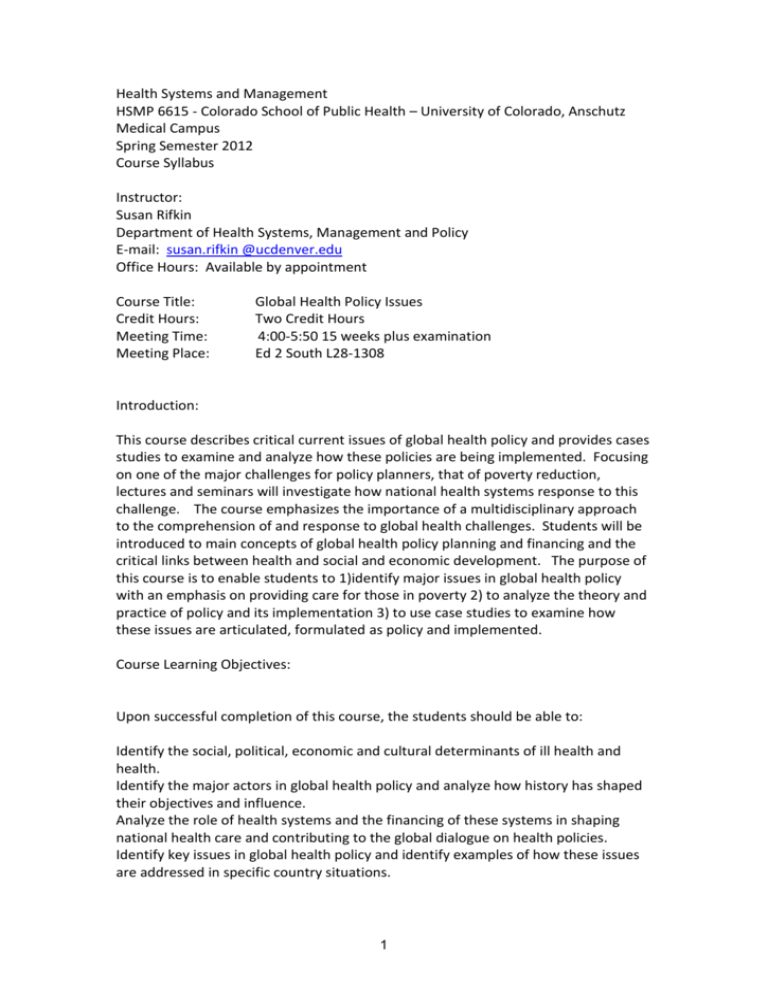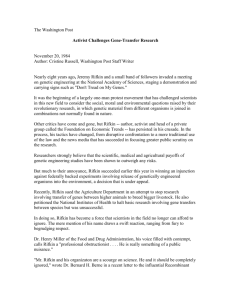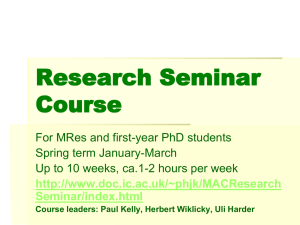Health Systems and Management - University of Colorado Denver
advertisement

Health Systems and Management HSMP 6615 - Colorado School of Public Health – University of Colorado, Anschutz Medical Campus Spring Semester 2012 Course Syllabus Instructor: Susan Rifkin Department of Health Systems, Management and Policy E-mail: susan.rifkin @ucdenver.edu Office Hours: Available by appointment Course Title: Credit Hours: Meeting Time: Meeting Place: Global Health Policy Issues Two Credit Hours 4:00-5:50 15 weeks plus examination Ed 2 South L28-1308 Introduction: This course describes critical current issues of global health policy and provides cases studies to examine and analyze how these policies are being implemented. Focusing on one of the major challenges for policy planners, that of poverty reduction, lectures and seminars will investigate how national health systems response to this challenge. The course emphasizes the importance of a multidisciplinary approach to the comprehension of and response to global health challenges. Students will be introduced to main concepts of global health policy planning and financing and the critical links between health and social and economic development. The purpose of this course is to enable students to 1)identify major issues in global health policy with an emphasis on providing care for those in poverty 2) to analyze the theory and practice of policy and its implementation 3) to use case studies to examine how these issues are articulated, formulated as policy and implemented. Course Learning Objectives: Upon successful completion of this course, the students should be able to: Identify the social, political, economic and cultural determinants of ill health and health. Identify the major actors in global health policy and analyze how history has shaped their objectives and influence. Analyze the role of health systems and the financing of these systems in shaping national health care and contributing to the global dialogue on health policies. Identify key issues in global health policy and identify examples of how these issues are addressed in specific country situations. 1 Critique programs, policies, and research addressing global health issues focusing on planning and financing of national health programs. Write a policy brief to make recommendations based data and analysis to a public health official for his/her actions. It is also the hope of the instructor that this course will inspire students to address global health challenges in their academic and professional careers. EVALUATION: In-Class Participation: 25% Assessed Essay: 50% Final Exam: 25% In-Class Participation: Seminars One quarter of the grade will be based on seminar presentations. Seminars will be for approximately 1 hour following the lecture. The topic for each seminar is described below with the lecture. Students will be divided into groups and each group will be responsible for managing at least one seminar presentations. Management will include introduction of the topic, development of an exercise for the class and summing up the conclusions. Students will need to read the assignment and prepare their presentations according the management group’s directions before the class. Most seminars will use case studies to illustrate how the policy topic is attempting to be implemented in specific country situations. Each group will have one case study with the managing group providing the overview of the topic and support for the presentations. The presentations will be no more that 10 minutes answering the following questions: What policy is being address and implemented? Why have they chosen to undertake these actions? Who is involved as planners? As intended beneficiaries? Where has the program be undertaken? When has it been undertaken? How has the planning and implementation be done? This part of the presentation should be the core analysis of the policy implementation highlighting achievements and challenges. The final part of the presentation should identify broad “take home” messages from the case study. 2 One quarter of the grade will be based on a written examination at the end of the course. The examination will be one hour. The examination will be composed of 4-6 essay questions of which each student must answer two of the questions. One half of the grade will be based on a written assessment. This is the assignment. Task Written Assignment (50% of the class grade) To write a policy analysis paper not exceeding 2000 words (excluding the appendices and references) as described below. You are a policy analyst in the research wing in the Ministry of Health of a country of your choice. A new Minister of Health has just been appointed and she wants a brief analytical document with recommendations on a specific policy area in the health sector with a view to drawing up policy proposals for the area. Please produce this document, drawing on the course material as appropriate. The document should be no more than 2000 words and presented as follows: Describe the background to, and context of, the problems that the policy is intended to address. Specify possible aims for policy and provide justification for the chosen policy. Critically analyze the relevant literature from countries, which have implemented the chosen policy and identify the lessons from their experience. Based on these lessons, make recommendations to the Minister of Health and reasons for the recommendations. Appendices (not in word count) A brief description of the country for which you are writing the brief. Please include an overview of the health status, major health problems, financing and delivery of health care. References (not in word count) Policy topics The policy area chosen may be any one of the following: Decentralization Management of human resources Community financing schemes Universal coverage for health care 3 The role of for-profit providers Role of civil society Donor Assistance for health programs Community Health Workers Expectations: Class attendance & Participation Attendance is not required, but is highly recommended. Policies: Academic Honesty: Refer to School/College guidelines. Students are responsible for being attentive to or observant of campus policies regarding academic honesty as stated in the University’s Student Conduct Code. Plagiarism is the use of another person’s words or ideas without crediting that person. Plagiarism and cheating will not be tolerated. Either plagiarism or cheating may lead to failure of an assignment, or the class, and/or dismissal from the University. You are responsible for being attentive to or observant of campus policies about academic honesty as stated in the University’s Student Conduct Code. (http://thunder1.cudenver.edu/studentlife/studentlife/discipline.html ) Access, Disability, Communication: The University of Colorado Denver is committed to providing reasonable accommodation and access to programs and services to persons with disabilities. Students requesting accommodations should contact: The Office of Disability Resources & Services (DRS) 13001 E. 17th Place, Building 500, Rm. W1103 (303) 724-5640. Their staff will assist in determining reasonable accommodations as well as coordinating the approved accommodations. Civility: Adherence to the Student Conduct Code is expected. I am committed to creating a climate for learning, characterized by respect for each other and the contributions each person makes to class. I ask that you make a similar commitment. Please turn off beepers and cell phones during class. 4 Schedule at a Glance Week 1 Date January 24 Topic Introduction to the course Presenter Susan Rifkin 2 January 31 Overview of Global Health Policy: Susan Rifkin 3 4 5 Discussion: How does health improve? The US Health Care Joel Levine System February 7 Group Work Introduction to writing a policy 2:305:50 analysis paper February 14 Seminar Low and Middle Income Countries and Health System Reforms February 21 Susan Rifkin and Elaine Morrato Susan Rifkin Seminar 6 February 28 Introduction to writing a policy analysis paper Susan Rifkin and Elaine Morrato 7 March 6 Major actor in Global Health Susan Rifkin 8 Presentation of policy analysis group work Decentralization March 13 Seminar 9 March 27 Private Study 5 Susan Rifkin 10 April 3 Financing Health Care Adam Atherly 11 April 10 Private/Public Partnerships Susan Rifkin Seminar 12 13 April 17 Human Resources for Susan Rifkin Health : Migration and Capacity Building Presentation of topics for Written Assignment Human Resources for Susan Rifkin Health: Community Health Workers April 24 14 May 1 15 May 8 Seminar Private Study Assessing Health System Reforms Susan Rifkin Written Assignment Due Role Play CLASS DESCRIPTION AND READING LIST: Week 1 Introduction to the Course This session will be an introduction to the entire course. We will review expectations from students. The course organizer will present the focus of the course and the potentials and limitations of the course framework. After introductions, we will look 6 at major challenges in global health policy and discuss why poverty alleviation is a key to meeting these challenges. We will discuss the course structure and the course assessments. Week 2 Lecture 1 Overview of Global Health Policy (Primary Health Care, the Social Determinants of Health) We will begin by listening to a clip from the Swedish public health statistician Hans Rosling who traces the changes in health status among the world’s nations and links it with income. He gives a background to the lecture which will start by examining what factors influence improved health status. The lecture will review the history of global health policy responses to these developments culminating with the acceptance of all nations of the World Health Organization of the policy of Primary Health Care. The final part of this lecture will look at the challenges of implementing this policy by national governments over the last 30. Seminar/Discussion We will focus on the question about how health improves by focusing on the role of health services. We will look at some of the reasons why services alone do not account for long term sustainable improvements of health in large populations and identify issues that public health policies must address to ensure better health for all. Readings: Lecture: Maciocco, G. Alma Ata to the Global Fund: a history of international health policy. Social Medicine. 3:1. 2008. pp. 36-48. (available online: www.socialmedicine.info/index.php/socialmedicine/article/view/186/380 WHO. Report of the Commission on the Social Determinants of Health (Executive Summary) 2008 WHO:Geneva (online:www.who.int) (executive summary) The World Health Report, 2008 Primary Health Care: Now more than ever. Available online at www.who.int/whr/2008 (executive summary) Additional Braveman P & Gruskin S. Defining equity in health. Journal of Epidemiology and Community Health. (2003) 57:254-258. 7 Lawn, J., Rohde, J., Rifkin, S., Were, M.,Paul, V., and Chopra, M. Alma-Ata 30 years on: Revolutionary, relevant and time to revitalize. 2008 The Lancet ( 917-927 (online: www.Lancet.com) Rasanathan K, Montesinos EV, Matheson D, et. al. Primary health care and the social determinants of health: essential and complementary approaches for reducing inequities in health J Epidemiol Community Health (2010). doi:10.1136/jech.2009.093914 Rifkin, S. and Walt, G. How health improves: defining the issues concerning "comprehensive primary health care" and "selective primary health care". Social Science and Medicine 1986 Vol 23, No 6, 1986.: 559-566. Wolfensohn, J. and Bourguignon, F. Development and Poverty Reduction: Looking Back, Looking Forward. 2004 World Bank online: http://www.worldbank.org/ambc/lookingbacklookingahead.pdf Week 3 Lecture 2 The US Health System ( Dr. Joel Levine) To understand how global health policy is formulated and implemented it is important to examine the health systems that most influence this process. The next three lectures will examine health systems and policies which are most dominate in this process. This lecture will present one of models of health care delivery that dominates the global health system. This model is based on a free market economy and a large role for private sector health care. Seminar: Your group is charged with creating a system of health care financing and delivery so that in 2020 the US will provide improved equitable access to high quality affordable health care for the poor and underserved. Each group will be given a role to play that of advocates for one of the following approaches 1) a real free market approach, 2) sole payer (Canada), 3) expansion of MK/MC services with a private insurance exchange (Obamacare), and 4) focused funding and expansion of the safety net. We will draw lots to decide on which approach you will be advocating for. Readings: Lecture: Myers,B. A. 1977 Health Care for the Poor Proceedings of the Academy of Political Science, Vol. 32, No. 3, Health Services: The Local Perspective, pp. 68-78. Katherine Swartz Health care for the poor: For whom, what care, and 8 whose responsibility? (source not known) Additional: Kunitz, S. and Pesis-Katz, I 2005 .Mortality of White American, African-Americans and Canadians: the causes and consequences for health of welfare state institutions and policies. Milbank Memorial Fund Quarterly 83:1 1-21. McKee, M and Stuckler, D. The assault on universalism: how to destroy the welfare State British Medical Journal 2011;343:d7973 doi: 10.1136/bmj.d7973 Week 4 Policy Analysis Workshop (see separate workshop description) Lecture 5 Low and Middle Income Countries and Health System Reforms The global health dialogue, as we have seen, sees equity as a major principle. Achieving equity has been hampered by both the lack of resources for the provision of health care and the misdistribution of available resources. The countries that have supported health care in poor countries and the UN/Bretton Woods organizations called for Health Sector Reforms in the 1980 to address issues of equity and quality of health care. We will identify the conflicting ideologies that helped shaped these reforms and look at some of the results of their implementation. Seminar: Each group will present an analysis of the effects of the health system reform agenda on health outcomes for one country. The presentations will be based on case studies. Groups are asked to examine the effects of reforms in their case study looking at both the potential and barriers to implementing the reforms. They will be asked to identify the assumptions about health improvements specific reforms were chosen to address and evidence of the effects on outcomes. Guidelines for presentation Why are reforms necessary? What is the main area of concern and how do the reforms address this area? What are the strengths and weaknesses of the proposed reforms? What are the “take home messages from the case study? Readings: Lecture Kaul, M. 1977 The new public administration: management innovations in government. Public Administration and Development 17: 13-26. 9 Sen K and Koivusalo M. Health care reforms and developing countries - a critical overview. International Journal of Health Planning and Management; 1998 13, 199215. Seminar Homedes, N and Ugalde. A. Twenty-Five Years of Convoluted Health Reforms in Mexico, PLoS Medicine 2009 Volume 6 | Issue 8 | e1000124 (online: www.plosmedicine.org Sakyi, E. K. A retrospective content analysis of studies on factors constraining the implementation of health sector reform in Ghana international journal of health planning and management 2008; 23: 259–285. Yip,W. and Mahal, A.The Health Care Systems of China and India: Performance and Future Challenges Health Affairs, 27, no.4 (2008):921-932 Additional Segall M. District health systems in a neoliberal world: a review of five key policy areas’. International Journal of Health Planning and Management, 2003 18 S5–S26 Swanson, R. C.Bongiovanni, A. , Bradley, E. et. al. 2010 Toward a Consensus on Guiding Principles for Health Systems Strengthening PLoS Medicine | Volume 7 | Issue 12 | e1000385 (online: www.plosmedicine.org) Week 6 Workshop on Policy Analysis Week 7 Lecture 4 Major actors in global health (UN system and donor aid) This lecture will focus on the major actors on the global health scene and their influence through financial contributions to low and middle income countries. We will briefly trace the history of the UN organization, focusing on the World Health Organization and the United Nations Children’s Emergency Fund (UNICEF) and the Bretton Woods Agencies (the World Bank and the International Monetary Fund), some of the national bi-lateral donors including the US and Great Britain and Nongovernment organizations. (NGOs) We will then examine donor aid and its influence on shaping health systems particularly in low and middle income countries. We shall describe how the health system reform agenda has dominated donor support the results of this orientation. We investigate the potentials and challenges of donor aid and consider its future in the present era of financial austerity. 10 Seminar Each group will be responsible to give a presentation using case studies on one of the following topics: The need for co-ordination of donor aid The role of the UN in defining health aid focus examining the tension between the World Bank and WHO The potential and challenges of SWAPS (Sector Wide Approaches) to strengthening national health systems The strengths and weaknesses of conditionalities for developing recipient nation’s accountability The challenge posed by new Actors particularly China is shaping the aid agenda Readings: Lecture Kickbusch, I Advancing the Global Health Agenda UN Chronicle, 2011 Vol. XLVIII No. Brown, T., Cueto, M. & Fee, E. The World Health Organization and the Transition from 'International' to 'Global Public Health'. American Journal of Public Health 2006 96 pp. 62-72. de Beyer JA et al. The role of the World Bank in International Health: Renewed Commitment and Partnership Social Science and Medicine 50: 2, 2000, 169 -176. Riddell, R. Does aid work? Can it work better?" North South Institute Panel 2008. Seminar Kirigiaa, M and Diarra-Namaa,A. Can countries of the WHO African Region wean themselves off donor funding for health? Bulletin of the World Health Organization 2008;86:889–895 Pfeiffer, J. International NGOs and Primary Health Care in Mozambique: the need for a new model of collaboration Social Science and Medicine 56 2003: 725-738. Sundewall, J, and Sahlin-Anderson, K. Translation of health sector SWAps,--a comparative study of health sector development cooperation in Uganda, Zambia and Bangladesh’, Health Policy 76(2006):277-287 Additional Killick, T. ‘Politics, evidence and the new aid agenda’, Development Policy Review 22:1 (2004), 5-29. 11 McCoy,D., Chand, S. and Sridhar, D. Global health funding in: how much, where it comes from and where it goes. (2009) Health Policy and Planning 24:407-417. Peters, D. and Chao, S. The Sector-Wide Approaches in Health: What is it? Where is it leading?" International Journal of Health Planning and Management 13 (1998), 17790 Week 8 Lecture 5 Decentralization and the Delivery of Health Services A major policy issue for government is the question about at what level of the government structure is responsibility for decisions on financing and delivery made. To examine this question we will look at a theory of decentralization that has been widely used in analyzing health policy issues. We will then look at case studies to see how this analysis helps us to understand the potentials and challenges of decentralizing health services. Seminar Each group will be given a case study to analyze and present finding concerning the expectations about these reforms and the outcomes in implementation. The theory of decision space will be used to examine the case studies Guidelines for presentations How does the theory of decision space apply to the case study? Does it help explain the success or failure of the implementation of decentralized services? What are the main challenges to policy implementation? How can these challenges be overcome particularly in the field of regulation? Readings: Lecture Bossert, T. Analyzing the decentralization of health systems in developing countries: decision space, innovation and performance .Social Science and Medicine. Vol. 47, No. 10, pp. 1513-1527, 1998 Bossert, T. and Beauvais, J. Decentralization of health systems in Ghana, Zambia, Uganda and the Philippines: a comparative analysis of decision space Health Policy and Planning 17(1): 14-31. Seminar 12 Collins C, Araujo J and Barbosa J. ‘Decentralising the health sector: issues in Brazil’, Health Policy 52:2 (2000), 113-127 Men B, et al. Key issues relating to decentralization at the provincial level of health management in Cambodia, International Journal of Health Planning and Management 20:1 (2005),3-19. Singh, Nirvikar. Decentralization and Public Delivery of Health Care Services in India. Health Affairs (2008) 27(4). Additional Mills A, Antonius R, Daniel J, Gray H, Haqq E, Rutten F. ‘The distribution of health planning and management responsibilities between centre and periphery: historical patterns and reform trends in four Caribbean territories’. Health Policy, 62 2002, 6584. Week 9 Financing Health Care ( Adam Atherly) TBA Week 10 Private/Public Partnerships While in the past health care for many countries has been provided mainly by the government, the current financial crises has demanded new channels of funding be identified and used. A major focuses has been to involve the private sector including non-profit foundations such as the Bill and Melinda Gates Foundation to provide substantial support to government programs. These partnerships have been key in provision of care particularly to the poor who have little or no resources to access services. This week we shall look at the potentials and challenges of this funding mechanism and examine the way in which these partnerships are being transformed by the global financial and political environment. Readings: Lecture Buse K & Harmer A. Seven habits of highly effective global public private health partnerships: practice and potential. Social Science and Medicine 64:2 (2007), 259271. Nishtar, S. Public – private 'partnerships' in health – a global call to action. Health Research Policy and Systems 2004, 2:5 doi:10.1186/1478-4505-2-5 13 Seminar Based on the case studies present arguments either to support or reject PPP as a means for improving health care delivery wider access in poor countries. Malmborg, R., Mann,G. and Squire, S.B. A systematic assessment of the concept and practice of public-private mix for tuberculosis care and control International Journal for Equity in Health 2011, 10:49 http://www.equityhealthj.com/content/10/1/49 Sambo, L. G and Kirigia, J.M. Africa’s health: could the private sector accelerate the progress towards health MDGs? International Archives of Medicine 2011, 4:39 http://www.intarchmed.com/content/4/1/39 Shet, A., DeCosta, A. Hielen, E. et.al, High rates of adherence and treatment success in a public and public-private HIV clinic in India: potential benefits of standardized national care delivery systems BMC Health Services Research 2011, 11:277 http://www.biomedcentral.com/1472-6963/11/277 Week 11: Private Study Week 12: Lecture 8 Human Resources for Health: migration, capacity building for health personnel There is a major concern today about human resources for health. Not only is there a lack of trained people to provide the services demanded but also the right people are not in the right place. This lecture will describe the situation concerning the lack of staff and highlight the role of migration around the world. It will then look at the type of staff necessary to meet health needs and examine how to build the necessary capacities through systematic analysis for planning and management. Readings: Lecture Dayrit, M., Taylor, A., Yan, J., Braichet, J., Zurn, P. and Shainblum, E. WHO code of practice on the international recruitment of health personnel. Bulletin of the World Health Organization 86:10 (October 2008) 739. (Online at: www.who.int 14 Martineau, T. and Willetts, A. "The health force: Managing the crisis ethical international recruitment of health professions: Will codes of practice protect developing country health systems?" Health Policy 75:3 (2006) pp. 358 -367. Potter, C. and Brough, R. ‘Health systems in developing countries: public sector managers and the management of contradictions and change’. International Journal of Health Planning and Management 18 (2003), S67-S78. WHO The World Health Report 2006: Working together for health Geneva: WHO, 2006 (Online: www.who. int ) (Read Executive Summary) Additional: Glassman, A., Becker, L. & de Ferranti, C. Planning and costing human resources for health", The Lancet 371: p. 693-695. (2008) Fritzen, S. Strategic management of the health workforce in developing countries: what have we learned?’ Human Resources for Health 26 February, 2007 http://www.human-resources-health.com/content/5/1/4 Rigoli,F. and Dussault, G. The interface between health sector reform and human resources for health Human Resources for Health 2003 1:9 http://www.humanresources-health.com/content/1/1/9 Stilwell,B., Dia llo, K, Zurn, P., Dal Po, M.R., Adams, O. and Buchan, J. (2003) Developing evidence-based ethical policies on the migration of health workers: conceptual and practical challenges. Human Resources for Health 2003, http://www.human-resources-health.com/content/1/1/8 WHO. WHO GLOBAL CODE OF PRACTICE ON THE INTERNATIONAL RECRUITMENT OF HEALTH PERSONNEL WHA63.16 Adopted May 2010. Week 13: Human Resources for Health: Community Health Workers With the increasing lack of trained health personnel particularly in poor and rural areas, there has been increasing interest in training local people to provide basic health care. Community Health Workers (CHW) gained popularity in the wake of the Alma Ata Declaration in 1978. Although challenges to initial programs decreased their popularity, in the wake of the HIV/AIDS epidemic they have seen resurgence. This lecture will review their history, identify main challenges and examine recent experiences of CHWs using the examples of Africa and India to define their potentials and limitations. Readings: 15 Lecture Rifkin SB. Community Health Workers. In Heggenhougen, K. and Quah, S. International Encyclopedia of Public Health. San Diego: Academic Press; 2008;(1):773-782 WHO 2007 Community health workers: What do we know about them? The state of the evidence on programmes, activities, costs and impact on health outcomes of using community health workers Geneva: WHO. Seminar Groups will review one case study each and present a SWOT (Strengths, Weaknesses, Opportunities and Threats) on the potentials and challenges in the case studies provided. The presentations should examine the possibility of creating mechanisms for accountability of the Government for health provision by the local community and for the empowerment of women. Bedjhat,H. Rifkin, S. B. Tarin, E and Sheikh, M. “A new role for women health volunteers in urban Iran in Eastern Mediterranean Health Journal 15:5: 1164-1173 2009. Manongi, R.N., Marchant, T.C. and Bygbjerg, I.C.Improving motivation among primary health care workers in Tanzania: a health worker perspective Human Resources for Health2006, 4:6 (available online at: http://www.human-resourceshealth.com/content/4/1/6 UNICEF 2004 What Works for Children in South Asia Country experiences: Bangladesh: UNICEF, Regional Office for South Asia: 4-8 Additional Campbell C, Gibbs A, Nair Y, and Maimane S. Frustrated Potential, False Promise or Complicated Possibilities? Empowerment and Participation amongst Female Health Volunteers in South Africa Journal of Health Management. 2009; 11(2): 315–336. Week 14 Private Study Week 15 Lecture 1 Assessing Health System Reforms (Written Assignment Due) This lecture will examine models of assessing health system. These models have been designed to see if the objectives of the reforms have been achieved and identify barriers to where they have not been achieved. Three models will be presented and the strengths and weaknesses of each will be discussed. 16 Seminar: For the concluding seminar of this course, we will do a role play. It will enable us to address major issues in health policy that we have identified and studied in this course. The role play will be based on examining how different actors present their views on how best to meet the Millennium Development Goals (MDGs). You will be divided into 5 groups. The country for which you are presenting your views is Ghana. You have a health profile of the country. Below is the scenario of the role play. You will be divided into five groups. All groups are representatives of various organizations in Ghana which are reviewing a new HSR agenda to fulfill its promises for the MDGs. The presenting groups must suggest why the approach considered by them is more appropriate for achieving MDGs. Groups Group A's role: You will represent MOH and make a presentation to support a major role for government in pursuing the MDGs. Group B's role: You will represent the Private/NGO sector and make a presentation to support HSR agenda in pursuing MDGs based on decentralization, public private partnership, and reduced role for government in health service delivery. Group C;'s role: You are a consortium of international donors who have been requested to fund health program in this country. You need to present a strategy to ensure your interests in accountability for funding is in place. Group D’s role: You are member of civil society advocating for a role in health decision making at the policy level, creation of structures to ensure human rights and a role at the community level to be able to have a voice in the way health services are delivered. Group E's role: You are members of the presidential committee who will be asked to make present a strategy for the government will follow to meet the MDGs. The presenting group must suggest why the approach considered by them is more appropriate for achieving MDGs. Readings Lecture Daniels, N. et. Al. ‘An evidence-based approach to benchmarking the fairness of health-sector reform in developing countries’ Bulletin of the World Health Organization 83:7 (2005), 534-540 Rifkin S ‘Linking equity and empowerment with health outcomes: it’s a matter of CHOICE’. Journal of Health, Population and Nutrition, 21:3 (2003),168 -180 17 WHO World Health Report 2000 Health Systems: Improving Performance http://www.who.int/whr/2000/en/whr00_en.pdf (Read the Overview) UNDP Millennium Development Goals online: http://www.undp.org/mdg/progress.shtml Seminar Please use all the information you have had available for the entire course. 18






